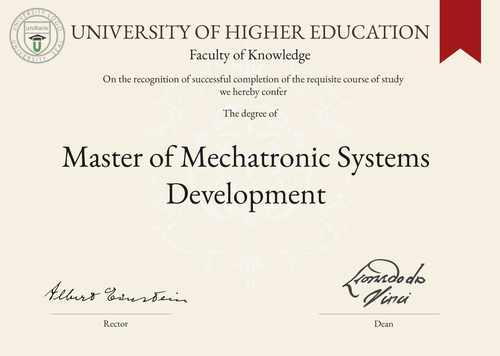
Master of Mechatronic Systems Development (MMSD)
Guide to Master of Mechatronic Systems Development Program/Course/Degree
Master of Mechatronic Systems Development (MMSD)

Program Name:
Master of Mechatronic Systems DevelopmentProgram or Degree abbreviation:
MMSDDuration range:
The duration of the program typically ranges from 1 to 2 years, depending on the university and country.Tuition range:
Tuition fees for the Master of Mechatronic Systems Development program vary depending on the chosen university and country. It is recommended to check with specific institutions for accurate information.Overview:
The Master of Mechatronic Systems Development program is designed to provide students with advanced knowledge and skills in the field of mechatronics. This interdisciplinary program combines elements of mechanical engineering, electrical engineering and computer science to develop professionals who can design, develop and manage complex mechatronic systems.Curriculum Overview by year:
The curriculum of the Master of Mechatronic Systems Development program is structured to provide students with a comprehensive understanding of mechatronics. The coursework typically covers subjects such as robotics, control systems, sensors and actuators, artificial intelligence, machine learning and system integration. Students also have the opportunity to engage in practical projects and research.Key Components:
The key components of the Master of Mechatronic Systems Development program include theoretical knowledge, practical skills and research experience. Students gain a deep understanding of mechatronic principles, learn to apply advanced technologies in system development and develop problem-solving and critical thinking abilities.Career Prospects:
Graduates of the Master of Mechatronic Systems Development program have excellent career prospects in various industries. They can work as mechatronics engineers, robotics specialists, automation engineers, control systems engineers, or research and development professionals. The demand for mechatronics experts is growing rapidly, offering diverse and rewarding career opportunities.Salary Expectations:
Salary expectations for graduates of the Master of Mechatronic Systems Development program can vary depending on factors such as location, industry and level of experience. Generally, mechatronics professionals enjoy competitive salaries due to the specialized nature of their skills and the high demand for their expertise. For a more accurate understanding of salary expectations, you can utilize the Job Sites Search Engine, from our sister site jobRank, which searches over 4,600 job sites worldwide. Make sure to specify not only the job title but also the country you are interested in.Conclusions:
It is important to note that the duration, tuition fees, curriculum, key components, career prospects and salary expectations of the Master of Mechatronic Systems Development program can vary depending on the chosen country or location of study, as well as the specific university. Prospective students are advised to research and compare different institutions to find the program that best suits their needs and goals. Visitors can search for where this specific degree, the Master of Mechatronic Systems Development, is offered anywhere in the world through the uniRank World Universities Search Engine.World Universities Search Engine
search for Master of Mechatronic Systems Development (MMSD) and add the Location (country, state etc.) or specific University you are interested in studying at.
Query examples:
- Master of Mechatronic Systems Development (MMSD) United States
- Master of Mechatronic Systems Development (MMSD) United Kingdom online
- Master of Mechatronic Systems Development (MMSD) Australia international students
- Master of Mechatronic Systems Development (MMSD) University of California
- Master of Mechatronic Systems Development (MMSD) University of London tuition fees
- Master of Mechatronic Systems Development (MMSD) University of Sydney scholarships
Share Program/Course
Interesting? Share this program/course/degree info with your friends now.